To R. J. M. Blackett and Beverly Jarrett and in memory of Susan Porter Benson
Preface
Part of this books research finds its origin in my doctoral dissertation on African American public education and health care, covering the period from 1910 to 1949. The research for the dissertation made me aware of the prominent role institution building had played in this particular African American communitys history. As a native St. Louisan growing up in this city during the 1960s and 1970s, I lived just blocks away from the Ville neighborhood and its most famous institutions, Homer G. Phillips hospital and Sumner High School. By the time I went to high school, my parents had bought a home some blocks north of my earliest childhood residence. So, I did not get to attend the nations oldest black high school west of the Mississippi. Instead, I attended Beaumont High, Sumners chief rival. I come from a working-class family, and my parents dedicated themselves to making sure I would receive a college education and all of the best they could provide, particularly their time and attention. Ironically, I did not become aware of Sumners elite image or of the symbolic importance attached to Homer G. Phillips Hospital until I began my dissertation research. Frankly, nobody I knew while growing up ever wanted to go to Homer Phillips, unless you were unfortunate enough to have been stabbed or shot. Homer G. as neighborhood folk used to refer to the hospital, had a reputation for having developed one of the nations best trauma centers.
I completed my dissertation with a deeper understanding of the meaning that racial segregation held for the generations of African Americans who were alive during the period of this study. I came away from that period of my research with a true appreciation for the segregated black institutions that African American reformers had fought so hard to create and maintain during the most entrenched period of institutionalized racial segregation in this nations history. However, it is African American social welfare reformers militant (though not particularly radical) efforts to establish and maintain these institutions, more than the institutions themselves, that continue to fascinate me. From a post-1960s perspective, it may seem unfathomable that I would describe as militant the actions of people whose strategies emphasized a relentless commitment to fact gathering, negotiations, petition drives, and consensus building, primarily through discussions and meetings with both allies and adversaries. However, if one considers that the dictionary defines militant, when used as an adjective, as vigorously active and aggressive, especially in support of a cause, then the people at the center of this study qualify as militant reformers.
Even in St. Louis where the black community enjoyed some important opportunities through their use of the elective franchise, significant institutional development, and liberally progressive social welfare organizations, African Americans and their reform representatives were not immune to the rank-and-file racial prejudice they confronted on a daily basis. Black social welfare reformers had to fight for even the least significant of their gains. In an interview given during the later years of the interwar period, one of the citys white residents revealed the subterranean racial hostilities these reformers struggled against, when she proclaimed that Lincoln had freed the slaves but their rights should end there.
I am excited that my book is coming out just as historians appear to be interested in reexamining the roots of African American reform efforts. I hope that Groping toward Democracy will inspire further historical research on the African American communitys search for equality and full citizenship rights during the Jim Crow era. I am particularly concerned that in our efforts to more thoroughly explore issues of socioeconomic class formation and class conflict in the black community, we have unwittingly set African American working-class culture in binary opposition to the culture of uplift. No one strategy worked in isolation from another strategy, nor was any one socioeconomic class group an island. The notion of racial uplift, which African Americans had adopted by the early part of the twentieth century and which historian Kevin Gaines appropriately summarized as an emphasis on self-help, racial solidarity, temperance, thrift chastity, social patriarchal authority, and the accumulation of wealth, was limited in its capability to address the fundamental challenges African Americans confronted during Jim Crow. Likewise, this racial uplift paradigm constricts our historical view of the various ways African Americans responded to those challenges. For example, a narrowly defined racial uplift or behavior paradigm has very little to teach us concerning African American participation in the building of civil society.
What I had not discovered during the dissertation stage of my research which subsequent primary and secondary research has revealed, is the dominant role the social work field and its environs played in supplying the ideological force behind African American social welfare reform agenda. I learned that the institution building efforts I had studied had taken place within the context of a community movement of local and national significance and, that despite the marginalizing effects of racial segregation, African Americans had participated in this movement.
The past three decades have witnessed the publication of a significant number of African American community studies, many featuring community organizing and institution building efforts. Thus, social historians are quite familiar with the term community organizing but are not as familiar with the term community organization when used to denote an organizing strategy and a social work subfield of study. During the 1920s and 1930s, in particular, the social work field dominated the province of community organization, its ideas and strategies. This books research introduced me to the ideas of a wide variety of sociologists, social workers, and adult educators whose interwar-period publications articulated the principles and ideas undergirding the social work-configured tradition of community organization. This study is likely the first to link African American social welfare reform efforts to certain ideas advanced by somewhat forgotten community organization analysts and practitioners such as Eduard C. Lindeman, Jesse F. Steiner, Joseph K. Hart, Walter Pettit, and Bessie McClenahaneach of whom was interested in the relationship between social work, community organization, and citizenship.
At the heart of the community movement was the community organizers desire to democratically guide and control community customs through scientific study and well-thought-out experience. One of the community movements most useful ideas, from African American social welfare reformers perspective, was the concept of the community as a whole, which demanded that the community as a social unit be considered in all areas of social planning. That idea, also called the common-cause approach, constituted an evolutionary development over the Progressive eras paternalistic reform emphasis on philanthropic efforts to aid individuals deemed less fortunate and in need of help. By the early 1920s, some community organization thinkers and practitioners were arguing that social problems must be tackled with a view toward how their solutions would affect communities and were also beginning to look at communities in relationship to one another. Just as some American slaves took hold of the promise for their own freedom embedded in the eighteenth centurys revolutionary rhetoric, African American reformers during the twentieth-century Jim Crow era would recognize the democratic potential for their ongoing struggle to attain equality and full citizenship rights embedded in the logic of the community as a whole principle.

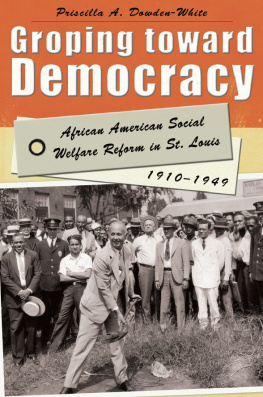

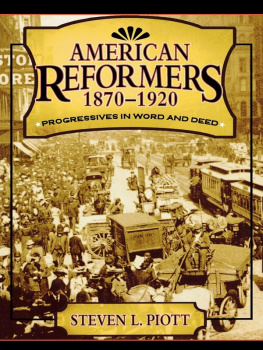
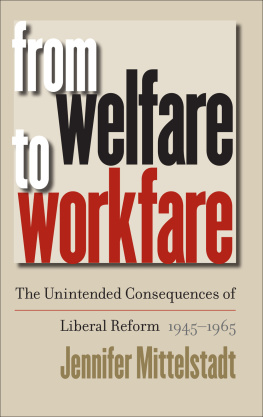

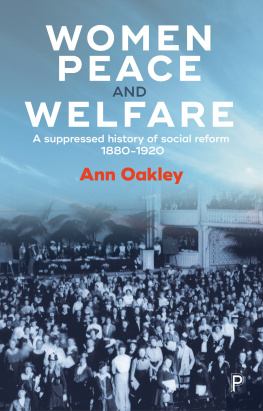
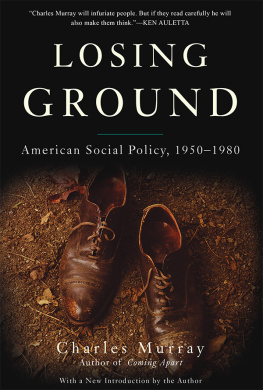
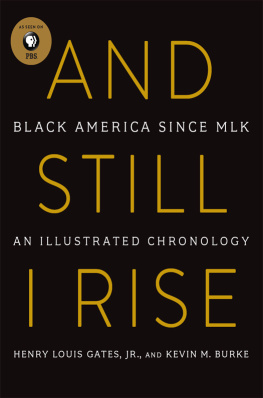

 This paper meets the requirements of the American National Standard for Permanence of Paper for Printed Library Materials, Z39.48, 1984.
This paper meets the requirements of the American National Standard for Permanence of Paper for Printed Library Materials, Z39.48, 1984.